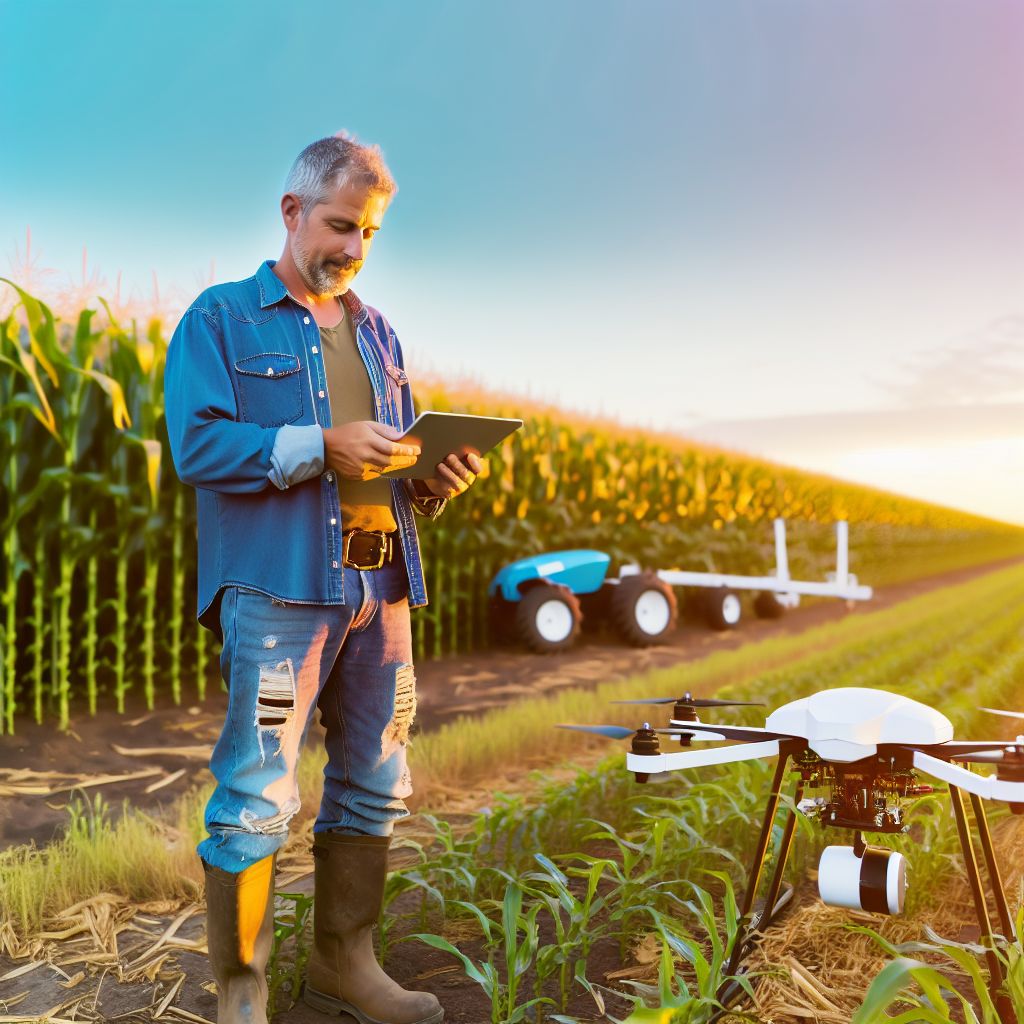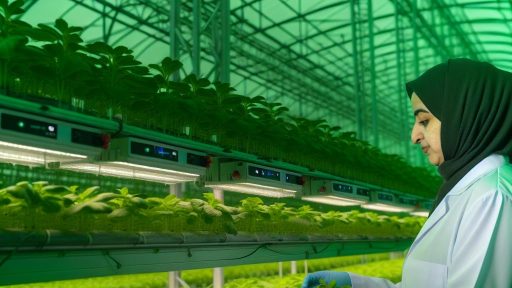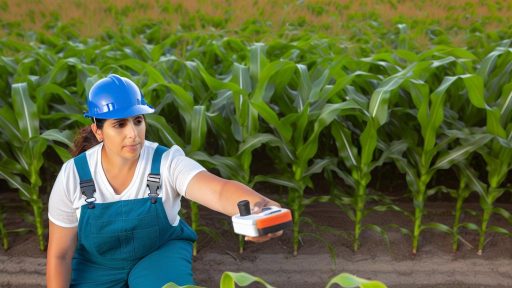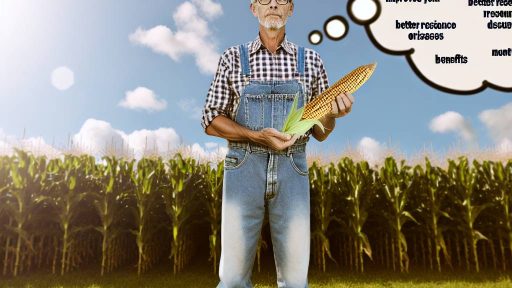Introduction to Biotechnology in Agriculture
Biotechnology plays a critical role in modern agriculture.
Farmers use advanced techniques to enhance crop yields.
These methods help in tackling various agricultural challenges.
Initially, biotechnology focuses on genetic modification.
This process alters the DNA of crops for beneficial traits.
Farmers can grow crops resistant to pests and diseases.
In addition, crops may tolerate extreme weather conditions.
Consequently, farmers can maintain productivity under stress.
Biotechnology also contributes to sustainable practices in farming.
This can lead to reduced chemical use and environmental impact.
Many farmers already utilize biotechnological advancements.
For instance, genetically modified crops have gained popularity.
These crops reduce the reliance on pesticides and herbicides.
Furthermore, they often increase food security for communities.
Biotechnology improves nutritional content in crops as well.
Transform Your Agribusiness
Unlock your farm's potential with expert advice tailored to your needs. Get actionable steps that drive real results.
Get StartedSome bioengineered crops offer enhanced vitamins and minerals.
Farmers can thus provide healthier options to consumers.
Additionally, biotechnology aids in efficient resource management.
Precision farming techniques use data for better decisions.
This leads to optimized input use, saving costs for farmers.
As a result, the overall productivity of farms increases.
Biotechnology transforms agriculture into a more productive field.
It allows farmers to adapt to changing conditions effectively.
With ongoing research, the future of agriculture looks promising.
Overview of Key Biotechnology Techniques Used in Agriculture
Genetic Engineering
Genetic engineering allows precise modifications to an organism’s DNA.
Scientists can enhance desirable traits in crops through this technique.
For example, they can increase pest resistance or boost nutritional content.
Additionally, crops can be engineered for drought resistance.
This technique helps farmers adapt to changing environmental conditions.
Micropropagation
Micropropagation enables the rapid production of plants from a small tissue sample.
This method ensures uniformity and disease-free plants.
Farmers can quickly multiply high-value crops using this technique.
Moreover, micropropagation supports the conservation of rare plant species.
Biopesticides
Biopesticides offer an alternative to traditional chemical pesticides.
These naturally derived products target specific pests without harming beneficial organisms.
Farmers benefit from reduced chemical usage which promotes sustainable practices.
Various biopesticides are available, including microbial and botanical options.
They enhance ecological balance on farms and improve soil health.
Marker-Assisted Selection
Marker-assisted selection accelerates the breeding process.
Showcase Your Farming Business
Publish your professional farming services profile on our blog for a one-time fee of $200 and reach a dedicated audience of farmers and agribusiness owners.
Publish Your ProfileThis technique uses molecular markers to select plants with desirable traits.
Farmers can enhance crop quality and yields efficiently.
Furthermore, it aids in developing crops resilient to diseases.
Tissue Culture
Tissue culture allows the cultivation of plant cells in a controlled environment.
This method promotes uniform growth and high-quality production.
It supports the development of hybrid varieties with superior traits.
Farmers benefit from improved crop performance through tissue culture innovations.
CRISPR Technology
The CRISPR technology revolutionizes genetic editing in agriculture.
Farmers can modify crops to improve yield potential and stress tolerance.
This process reduces the time required to breed new plant varieties.
Ultimately, CRISPR enhances food security in changing climates.
Genetically Modified Organisms (GMOs): Benefits and Risks for Farmers
Introduction to GMOs
Genetically modified organisms (GMOs) have transformed agriculture significantly.
Farmers widely use GMOs to enhance crop yields and reduce losses.
However, the debate surrounding GMOs continues to evolve.
Benefits of GMOs for Farmers
GMOs provide several advantages for agricultural practices.
Firstly, they increase resistance to pests and diseases.
This resistance leads to reduced reliance on chemical pesticides.
Consequently, environmental impacts are minimized.
Additionally, GMOs can enhance crop tolerance to harsh climatic conditions.
Crops can be engineered to withstand droughts or flooding.
As a result, farmers can maintain productivity during extreme weather events.
Furthermore, GMOs can improve nutritional content in food crops.
This enhancement can help address malnutrition in various regions.
Many farmers appreciate the potential to provide healthier food options.
Risks and Concerns Associated with GMOs
Despite their benefits, GMOs pose certain risks that farmers must consider.
One major concern is the potential for cross-contamination with non-GMO crops.
This situation can lead to economic challenges for organic farmers.
Moreover, some studies suggest possible long-term health effects of GMOs.
Consumers remain divided on the safety of GMO products.
Consequently, public perception can influence market demand.
Another risk involves over-reliance on specific GMO traits.
This dependence may lead to the development of resistant pests or weeds.
Consequently, farmers could face increased production costs over time.
Regulatory and Ethical Considerations
The regulatory landscape for GMOs varies greatly by country.
Farmers must navigate these regulations carefully.
In some regions, stringent approval processes exist before GMO crops can be planted.
Ethical concerns also play a significant role in the GMO debate.
Many groups advocate for labeling GMO products for consumer transparency.
This labeling can help consumers make informed choices about their food.
Implications of GMOs for the Future of Agriculture
GMOs present both opportunities and challenges for farmers.
Showcase Your Farming Business
Publish your professional farming services profile on our blog for a one-time fee of $200 and reach a dedicated audience of farmers and agribusiness owners.
Publish Your ProfileBy weighing the benefits against the risks, farmers can make informed decisions.
Ultimately, the future of GMOs will depend on ongoing research and public perception.
Discover More: Biotechnological Approaches To Disease Resistant Plants
Biotechnology in Crop Improvement
Enhanced Traits Through Genetic Engineering
Genetic engineering allows for precise modifications in crops.
By introducing specific genes, farmers can enhance various traits.
This method improves resistance to pests and diseases.
Furthermore, it boosts tolerance to environmental stressors.
Crops can become more resilient to drought, salinity, and extreme temperatures.
As a result, farmers can maintain yields even in challenging conditions.
Increased Yields with Biotechnology
Biotechnology significantly increases crop yields.
Through improved plant varieties, farmers can produce more food.
These varieties may have faster growth rates or larger fruits.
Moreover, they can utilize resources more efficiently.
This efficiency leads to higher productivity per acre.
Ultimately, enhanced yields support food security for growing populations.
Benefits of Herbicide and Pest Resistance
Many biotech crops are engineered for herbicide resistance.
This trait allows farmers to manage weeds more effectively.
Consequently, they can use less tillage, promoting soil health.
Additionally, pest-resistant crops reduce the need for chemical pesticides.
This approach results in lower production costs for farmers.
By minimizing chemical applications, environmental impact decreases.
Biofortification and Nutritional Enhancement
Biotechnology also enables biofortification of crops.
This process enhances the nutritional quality of staple foods.
Crops can be enriched with essential vitamins and minerals.
For example, golden rice contains increased vitamin A levels.
Such advancements help combat malnutrition in vulnerable populations.
Farmers can contribute to community health through improved nutrition.
Adoption of Biotech Innovations
Farmers increasingly adopt biotechnology in their practices.
This trend reflects a growing awareness of its benefits.
Local agricultural cooperatives often support this adoption.
Furthermore, outreach programs educate farmers on best practices.
Consequently, successful cases demonstrate the value of biotech crops.
Such efforts promote wider acceptance and integration in farming.
Delve into the Subject: Cost-Effective Automated Machinery Options For Farmers
Biopesticides and Biofertilizers: Sustainable Alternatives for Farmers
Introduction to Biopesticides
Biopesticides offer an eco-friendly solution for pest management.
These natural agents help reduce reliance on chemical pesticides.
Farmers can benefit from lower environmental impact and enhanced biodiversity.
Types of Biopesticides
Biopesticides include microbial pesticides, plant-incorporated protectants, and biochemical pesticides.
Microbial pesticides utilize bacteria, fungi, or viruses to target pests effectively.
Plant-incorporated protectants involve genetically modified plants that produce pest-resistant substances.
Showcase Your Farming Business
Publish your professional farming services profile on our blog for a one-time fee of $200 and reach a dedicated audience of farmers and agribusiness owners.
Publish Your ProfileBiochemical pesticides come from natural materials like plants or minerals.
Benefits of Using Biopesticides
Biopesticides help control pests in a sustainable manner.
They reduce chemical residues on crops and promote safer food products.
This approach also encourages natural pest predators, enhancing pest control.
Introduction to Biofertilizers
Biofertilizers improve soil health while supplying essential nutrients.
They utilize living microorganisms to boost plant growth and fertility.
Farmers can tap into microbial benefits for healthier plants and soil ecosystems.
Types of Biofertilizers
Common biofertilizers include nitrogen-fixing bacteria, mycorrhizal fungi, and phosphorous-solubilizing bacteria.
Nitrogen-fixing bacteria convert atmospheric nitrogen into organic forms plants can use.
Mycorrhizal fungi enhance nutrient uptake through symbiotic relationships with plant roots.
Phosphorous-solubilizing bacteria help unlock phosphorous, making it available for plant absorption.
Advantages of Biofertilizers
Biofertilizers increase soil fertility and enhance crop yields sustainably.
They promote microbial activity, fostering healthier soil ecosystems.
Moreover, they can help reduce the need for synthetic fertilizers, cutting costs for farmers.
Integrating Biopesticides and Biofertilizers
The combination of biopesticides and biofertilizers offers comprehensive agricultural benefits.
This integration fosters a balanced ecosystem, enhancing overall farm productivity.
Farmers can create a more resilient agricultural system through sustainable practices.
Ultimately, these solutions contribute to improved food security and environmental sustainability.
Learn More: Optimizing Resource Use in Controlled Environment Agriculture
Role of Biotechnology in Pest and Disease Management
Introduction to Biotechnology in Agriculture
Biotechnology plays a crucial role in modern agriculture.
It helps farmers combat pests and diseases effectively.
This technology enhances crop resilience and productivity.
Genetically Modified Organisms (GMOs)
GMOs are developed to resist specific pests.
For instance, Bt corn contains a gene from the bacterium Bacillus thuringiensis.
This gene produces a protein toxic to certain insects.
Farmers experience reduced pesticide use with GMOs.
Biopesticides
Biopesticides offer an eco-friendly alternative to traditional pesticides.
They often originate from natural materials like plants and minerals.
These products target specific pests while sparing beneficial insects.
Consequently, they contribute to sustainable pest management strategies.
Plant Breeding Techniques
Advanced breeding techniques create disease-resistant crop varieties.
Marker-assisted selection accelerates this process significantly.
This method identifies and selects desirable traits efficiently.
Farmers are increasingly adopting these resistant varieties to reduce losses.
Biotechnology in Disease Resistance
Biotechnology enhances crops’ ability to resist viral and fungal diseases.
Crops can be engineered to express resistance genes.
For example, research on rice has led to varieties that resist bacterial blight.
This reduction in disease severity boosts overall yield quality.
Future Prospects
The future of biotechnology in agriculture looks promising.
Ongoing research aims to develop crops with even greater resistance.
Showcase Your Farming Business
Publish your professional farming services profile on our blog for a one-time fee of $200 and reach a dedicated audience of farmers and agribusiness owners.
Publish Your ProfileFarmers will benefit from these innovations through sustainable practices.
Ultimately, biotechnology will continue to advance agricultural resilience.
Explore Further: Drone Technology Transforming Farm Operations

Impact of Biotechnology on Soil Health and Fertility
Enhancing Soil Microbial Activity
Biotechnology significantly enhances soil microbial activity.
This increase boosts nutrient availability for plants.
For example, genetically modified crops can promote beneficial microorganisms.
As a result, healthy microbial communities thrive in the soil.
Improving Nutrient Utilization
Farmers benefit from biotechnological advancements in nutrient utilization.
Crops can be engineered to absorb nutrients more efficiently.
This efficiency reduces the need for chemical fertilizers.
Consequently, soil fertility improves over time.
Enhancing Soil Structure
Biotechnology also contributes to better soil structure.
Certain crops produce organic compounds that bind soil particles.
This binding improves aeration and water retention.
Therefore, healthier soil leads to increased crop productivity.
Mitigating Soil Erosion
Genetically modified crops can help reduce soil erosion.
They have deeper root systems that stabilize the soil.
Stable soil minimizes the loss of topsoil during rainfall.
Consequently, this helps maintain soil quality over time.
Cultivating Cover Crops
Farmers are increasingly using cover crops to enhance soil health.
These crops, often genetically modified, enrich the soil with organic matter.
They also help prevent weed growth during fallow periods.
As a result, cover crops contribute to soil biodiversity and fertility.
Reducing Soil Compaction
Biotechnology aids in the reduction of soil compaction issues.
Certain modified crops can grow in compacted soil conditions.
These crops improve soil structure through their root systems.
Therefore, growth becomes more feasible in previously unproductive areas.
Enhancing Soil Resilience
Biotechnology enhances soil resilience to climate change.
Crops developed to withstand extreme conditions contribute to this resilience.
They minimize soil degradation during droughts or heavy rainfall.
This adaptability safeguards future agricultural productivity.
Case Studies: Successful Implementation of Biotechnology by Farmers
Introduction to Biotechnology in Agriculture
Biotechnology revolutionizes the agricultural landscape for farmers.
This innovative approach enhances crop yields and sustainability.
Farmers utilize biotechnological methods to improve their practices.
Case Study: Organic Corn Production
In Illinois, Samuel Greene successfully adopted biotechnology in organic corn farming.
He utilized genetically modified seeds resistant to pests and diseases.
This significantly reduced his reliance on chemical pesticides.
As a result, his corn yield increased by 30% in just one season.
Case Study: Drought-Tolerant Crops
Maria Gonzalez, a farmer in Texas, faced recurring droughts.
She implemented biotechnology to develop drought-resistant varieties of wheat.
Showcase Your Farming Business
Publish your professional farming services profile on our blog for a one-time fee of $200 and reach a dedicated audience of farmers and agribusiness owners.
Publish Your ProfileThis adjustment allowed her to maintain production during dry spells.
Consequently, her profits increased as she minimized crop losses.
Case Study: Improved Nutritional Value
In California, Emily Chen began cultivating biofortified rice.
This rice contains higher levels of essential vitamins and minerals.
Her targeted approach addresses nutritional deficiencies in the community.
As a result, Emily’s rice became a preferred choice among local consumers.
Case Study: Sustainable Pest Management
Farmers in Florida adopted biotech solutions for pest management.
They introduced beneficial insects that naturally control pest populations.
This practice improved crop health and reduced chemical pesticide use.
Moreover, it enhanced the ecosystem by supporting biodiversity.
Lessons Learned from Case Studies
These case studies highlight the advantages of biotechnology for farmers.
They demonstrate increased yields, improved sustainability, and better nutrition.
Farmers can leverage biotechnology to address local agricultural challenges.
Ultimately, this approach fosters a more resilient farming future.
Future Trends in Agricultural Biotechnology and Implications for Farmers
Advancements in Genetic Engineering
Genetic engineering continues to evolve rapidly in agriculture.
Farmers can expect improved crop varieties with enhanced traits.
This includes higher yields, disease resistance, and better nutritional value.
For example, genetically modified crops can withstand harsh weather conditions.
Consequently, farmers can cultivate crops in diverse environments.
Integration of Biotechnology and Precision Agriculture
Biotechnology increasingly integrates with precision agriculture techniques.
Farmers leverage GPS technology and data analytics for optimized farming.
This combination enhances resource efficiency and reduces waste.
Additionally, farmers can monitor plant health in real-time.
This leads to timely interventions and disease management.
Growing Adoption of Biopesticides and Biofertilizers
Farmers are gradually shifting towards biopesticides and biofertilizers.
These products offer eco-friendly alternatives to synthetic chemicals.
Using biopesticides helps protect beneficial insects in farms.
Moreover, biofertilizers improve soil health and enhance nutrient uptake.
This shift bolsters sustainability in agricultural practices.
Emergence of Vertical Farming Technologies
Vertical farming represents a significant innovation in agriculture.
It allows farmers to grow crops in urban areas year-round.
This method maximizes land use and minimizes transportation costs.
Additionally, vertical farms can operate with reduced water use.
Farmers can tap into local markets and reduce carbon footprints.
Impacts of Consumer Preferences on Biotech Adoption
Consumer preferences are shifting towards non-GMO and organic products.
Farmers will need to adapt to these changing demands.
This transition might involve investing in organic farming practices.
Moreover, transparency in agricultural methods will become crucial.
Farmers can enhance trust and loyalty among consumers through open communication.
Regulatory Changes and Their Implications
The regulatory environment around agricultural biotechnology is evolving.
Showcase Your Farming Business
Publish your professional farming services profile on our blog for a one-time fee of $200 and reach a dedicated audience of farmers and agribusiness owners.
Publish Your ProfileFarmers must stay informed about legislation affecting biotech crops.
Changes in regulations can influence market access and consumer choices.
Additionally, farmers may face challenges in product approval processes.
Thus, understanding the regulatory landscape is vital for successful adoption.




